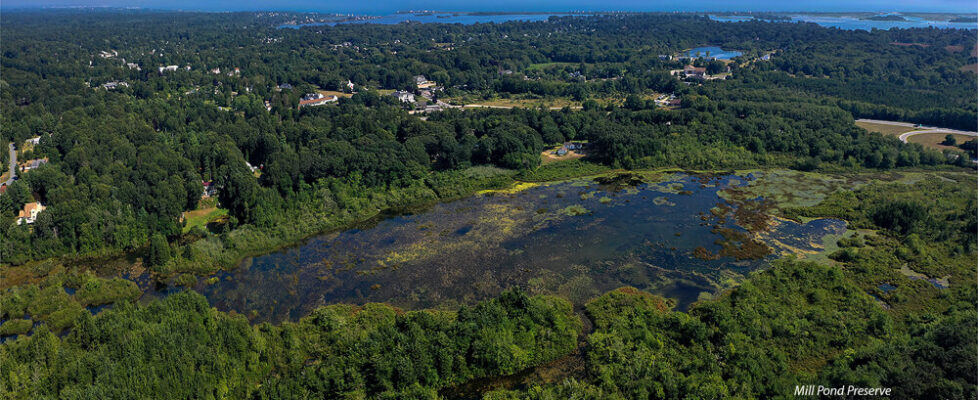Leo Mainelli: Hard Lessons Learned From A Small Town In Connecticut
A version of this letter was sent to the Charlestown Town Council and is shared with us here by the author Leo Mainelli. Leo is the President of the Charlestown Citizens Alliance.
I relay this story of a small town in Connecticut that has important lessons for Charlestown.
I bought a home in this small town in a development on a one-acre lot in 1967. I was involved in that town’s government from 1970 until I moved to Charlestown full-time in 2000. During much of the that time I served in elected office.
In 1970, the town had a population of 7,000 and was served by municipal water. The town was dependent on individual septic systems. Most of the fertile soil was farmed, and most of the remaining land was clay with very poor drainage or ledge, which was even more problematic for septic systems. In some areas, you could see water running off the land and down the street.
After my time on the town council, the new council decided to install a wastewater treatment plant and sewers throughout the town and purchased a bond to do so. The new wastewater treatment plant was located in the southwest corner of town, and septic lines were laid throughout town. Every property was assessed for the bond, but the additional cost of hooking up to the system was up to each property owner.
The decision to install the treatment plant and sewer lines was motivated by failing septic systems, poor stormwater management, and the thought that town growth was limited. There were no apartments, condos, or medium and low-income housing in town, and the phrase, “Our children cannot afford to live here” was heard.
What happened next surprised almost everyone. The population jumped from 7,000 to 17,000 in less than ten years, due mostly to the construction of medium to high-price apartments, condos, and houses, with a small amount of medium-cost housing. The town’s population is now 27,000.
The additional residential housing, however, did not help our children to be able to live in the town. What did change was that farmland was sold to developers, and builders connected to the town’s wastewater treatment system. The additional residential growth was followed by shopping malls and necessitated adding to the high school, doubling the size of the middle school, and building an additional elementary school. On the municipal side, the town hall needed to be enlarged, the library was expanded, the police department got a new building, and a new fire station was added. Taxes of course increased to cover the new infrastructure.
The story of a small Connecticut town illustrates that failing to protect our groundwater in Charlestown would result in the need for drastic and expensive action to service our existing population–a fix that could also result in a surge in residential growth with unintended consequences.
The lessons I would like anyone who reads this to take away are:
- Protect our drinking water by protecting our groundwater.
- Be mindful to not overload the capacity of the land to support individual septic systems by increasing the density of housing units beyond what is reasonable for the land to support.
Protecting our groundwater will involve preserving enough land for our septic systems to treat wastewater and for the rainwater to re-charge aquifers and thus will involve protecting more open space, careful use of impervious surfaces, and reasonable control over the density of our growth.
The failure to learn these lessons could be very challenging and expensive for Charlestown. This might not occur for 7 to 10 years from now, but we all need to be aware of what we will leave for future generations.

The banner image by the late Vic Dvorak is an aerial photo of Mill Pond Preserve, one of Charlestown’s open space properties that works to protect our drinking water.

August 12, 2024 @ 10:30 am
Leo Mainelli- A South Windsor Legend!
August 6, 2024 @ 6:10 pm
thank you
August 4, 2024 @ 4:34 pm
Thankyou Leo for this well informed, thoughtful piece! Agree with David, Mel, Rob, and Peter’s comments.
August 4, 2024 @ 2:04 pm
Mr Mainelli concludes his story with two simple lessons that should be the foundation of Charlestown’s planning decisions. I’m not confident the current town council has the same vision for our town as its residents.
August 4, 2024 @ 12:14 pm
Thank you Leo for your thoughtful words of wisdom. It’s astonishing that calls for affordable housing can only be seen as possible through destruction of our open space and wildlife habitat. How about converting all the existing empty retail space we have cluttering the strip malls that blight our state? I applaud you for calling out this warning and pray that your words are heard by all and encourage everyone to vote out those who refuse to listen.
August 4, 2024 @ 9:12 am
The fact that any town official does not understand the truth in this story is sad. I believe that official who promotes significant reduction in regulations to spur growth or ignores the warning signs of overuse of our finite resources is not ignorant but has ulterior motives unfortunately.
August 4, 2024 @ 8:50 am
There is only one reason why land restrictions are being weakened in order to build more, somebody’s pockets are getting lined with cash – it’s that simple. A tale as old as time itself.